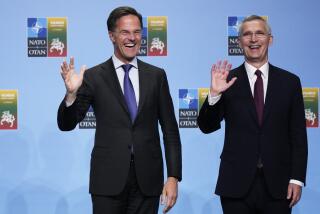Joseph Luns, 90; Led NATO at a Critical Time
- Share via
Joseph Luns, the Dutch foreign minister for 19 years and NATO chief who guided the alliance through a critical Cold War decade, died Wednesday. He was 90.
A Dutch Foreign Ministry spokesman said Luns died at his home in Brussels during the night. The cause of death was not announced, but Luns had reportedly been in failing health.
He was a leading statesman in the West during his long service as the Netherlands’ foreign minister and 13 years as NATO secretary-general.
He served in eight successive Dutch Cabinets until 1971, when he was named head of NATO.
He was regarded as one of the most vigorous and effective architects of postwar European unity, and held an unshakable belief in an Atlantic partnership, stressing the need for good relations between Europe and the United States.
The tall, thin Luns loved jokes and brought a breezy personal style to the North Atlantic alliance. His unorthodox approach made him a favorite of journalists. Asked once how many people worked at NATO headquarters, he responded: “About half of them.”
Before Luns took over, NATO had made a start on increasing the European share of the Atlantic defense. He continued that trend, pushing reluctant governments, including his own, into making a greater defense effort.
He laid heavy emphasis on building a stronger and more united Europe.
Luns was born Aug. 28, 1911, in Rotterdam. He served in the Dutch navy before studying law at the University of Leyden and the University of Amsterdam. He received his doctorate in law from the University of Amsterdam in 1937.
His career in international politics was dotted with controversy, especially in 1979 over disclosure of his prewar membership in a Nazi organization.
Luns’ link to the Dutch national socialist movement from 1933 to 1936 surfaced in a newspaper story. It was confirmed soon afterward and led to a full-scale parliamentary debate.
For his part, Luns first denied joining the group, then told the government he was put on party lists without his knowledge by a brother who later canceled the membership. Legislators decided against holding an inquiry.
More to Read
Sign up for Essential California
The most important California stories and recommendations in your inbox every morning.
You may occasionally receive promotional content from the Los Angeles Times.













